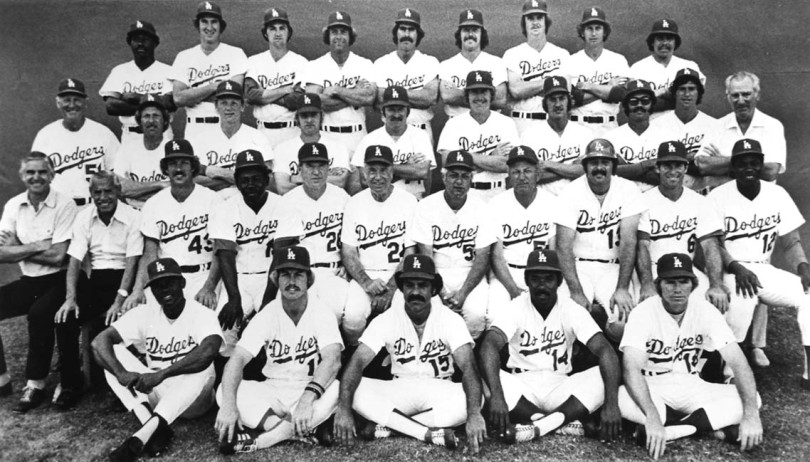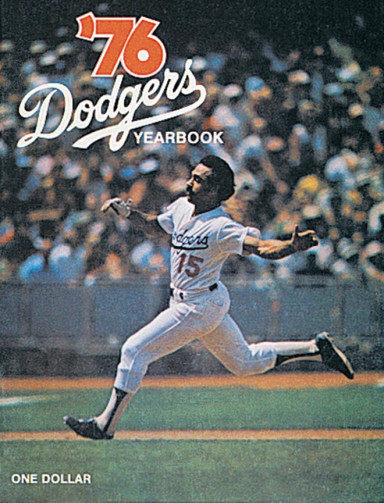
The 1976 Dodgers
- 1976 Record:
- 92-70, 2nd place in N.L. Western Division
- Postseason:
- None
- Manager:
- Walter Alston
- All-Stars:
- Ron Cey, 3B; Steve Garvey, 1B; Rick Rhoden, P; Bill Russell, SS
- Home Attendance:
- 2,386,301
Season Recap:

1976 Dodgers Yearbook
Copyright © Los Angeles Dodgers, Inc.
After 23 seasons as Dodger Manager, Walter Alston stepped down a week before the conclusion of the 1976 campaign, passing the baton to Tommy Lasorda on September 29. Lasorda had served from 1973-76 as third base coach for Alston. The “Quiet Man” from Darrtown, OH, who had entered the position hand selected by O’Malley and the Dodger brass with questions like “Walt Who?” because he had played in only one major league game, answered his critics in a Hall of Fame career in which he won 2,040 games. That places Alston sixth on the all-time win list for managers. He won his 2,000th game on July 17 against Chicago. The Dodgers narrowed the gap between them and Cincinnati in 1976, but still finished 10 games behind the Big Red Machine. The previous season, the Dodgers were 20 games behind the Reds. April showers brought the Dodgers a rainout in their home opener, a tough beginning to the season and it ended a streak of 737 consecutive games without a rainout at Dodger Stadium. It was only the club’s second rainout in the history of Dodger Stadium. After dropping their first five games, the Dodgers bounced back to win 23 games in their next 27 and hovered around first place in the month of May. That was the high water mark for them, however, as they slipped behind the Reds and never threatened again. Had the Dodgers been able to do as well against the West Division as they did against the East, it might have been a whole different race. Against the East, the Dodgers were 50-22, while against the West, they were 42-48. Don Sutton won 21 games for the Dodgers and helped lower the staff ERA to 3.02, second best in the majors. Tommy John’s incredible comeback from reconstructive elbow surgery after a year and a half layoff produced a 10-10 record. John’s groundbreaking surgery later became an almost routine type of medical procedure by team physician Dr. Frank W. Jobe, known as “Tommy John surgery.” Right-hander Rick Rhoden completed a 12-3 season, while Doug Rau picked up 16 wins and narrowly lost the N.L. era title on the season’s final day at 2.57. In the bullpen, knuckleballer Charlie Hough was 12-8 with 18 saves. Offensively, the Dodgers sputtered and had trouble scoring runs. Steve Garvey became the first Dodger to collect three straight 200 or more hit seasons. He and Ron Cey paced the Dodgers with 80 RBI each. Injuries to Reggie Smith, Dusty Baker, Bill Russell, Bill Buckner and Davey Lopes slowed the team’s prospects. Lopes did return from five weeks on the shelf to swipe 63 bases and to top the N.L. charts. When all was said and done, however, the highlight that stands out to Dodger fans occurred on April 25, 1976 when Chicago Cubs’ outfielder Rick Monday stopped a pair of dissidents from burning an American flag on the field, as he ran from his position to snatch it and carry it to safety. He received a standing ovation at Dodger Stadium, but won more than the hearts of fans at the ballpark that day — he received the plaudits of all Americans for his heroic and brave act. In the June Free Agent Draft, the Dodgers chose Mike Scioscia, who debuted in 1980 and later became the club’s all-time leader in games caught with 1,395.
Below are the Dodger Front Office department heads and personnel, plus scouts who worked for Walter O’Malley.
- Board of Directors
- Walter O’Malley, Chairman of the Board; Peter O’Malley, President; Harry M. Bardt, Treasurer; Roland Seidler, Jr., Secretary; Sylvan Oestreicher, H. C. McClellan, Robert L. Gordon.
- President:
- Peter O’Malley
- Vice President, Player Personnel:
- Al Campanis
- Vice President, Minor League Operations:
- William P. Schweppe
- Vice President, Marketing:
- Merritt Willey
- Vice President, Public Relations & Promotions:
- Fred Claire
- Controller & Assistant Treasurer:
- Ken Hasemann
- Assistant Secretary:
- Irene Tanji
- Director of Advertising, Novelties & Souvenirs:
- Danny Goodman
- Director, Dodgertown:
- Charlie Blaney
- Director, Stadium Operations:
- Bob Smith
- Director, Ticket Operations:
- Walter Nash
- Director, Stadium Club & Transportation:
- Robert J. Schenz
- Director, Dodger Network:
- David Van de Walker
- Director, Scouting:
- Ben Wade
- Director, Publicity:
- Steve Brener
- Director, Community Relations:
- Don Newcombe
- Director, Speakers Bureau:
- Tuck Stainback
- Executive Pilot, Dodger 720-B Fan Jet:
- Captain Lewis Carlisle
- Administrative Assistant:
- Ike Ikuhara
- Traveling Secretary:
- Lee Scott
- Auditor:
- Michael Strange
- Manager:
- Walter Alston
- Club Physicians:
- Dr. Frank Jobe, Dr. Robert Woods
- Scouts:
- Rafael Avila, Boyd Bartley, Bill Brenzel, Jerry Cunningham, Mel Didier, Dick Hager, Gail Henley, Goldie Holt, Tony John, Dale Jones, John Keenan, Ron King, Ed Liberatore, Dick McLaughlin, Dale McReynolds, Tommy Mixon, Lew Morton, Greg Mulleavy, Mel Nelson, George Noga, John O'Neil, Regie Otero, Ed Roebuck, Rudy Rufer, Jerry Stephenson, Guy Wellman, Bert Wells

